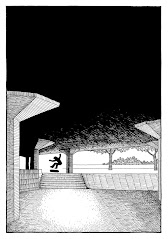Jude Kelly OBE, Artistic Director of the Southbank Centre, has taken to the Standard to tell the skateboarders exactly why we really ought to just pipe down.
Here's her article with my thought in italics:
A theme of Richard Sennett’s Together: The Rituals, Pleasures and Politics of Co-operation is that only co-operation between people with different interests allows us to interact as properly social beings.
- A theme of Aldous Huxley's 'Brave New World' is that homogeneity, predictability and mindless consumerism are damaging to the soul.
As one of London’s great public spaces, there’s an irony in these words for the Southbank Centre as it launches its summer-long Festival of Neighbourhood, featuring Sennett. The centre is in an unappetising — and expensively legal — wrangle with skateboarders over plans to fund its Festival Wing refurbishment by relocating the skate park to the other side of the Royal Festival Hall.
- Why unappetising? I was there and it seemed like a of people (whether they were skating or not) had a great time at this event
- "Expensively legal"?
- You say wrangle, I say proper interaction as social beings.
- The "skate park" is not being relocated. It is being demolished and a new facility built in a separate location. This is a small distinction, but a crucial one.
A potent symbol of the counterculture, the skateboarders appear at first glance to be right in refusing to budge an inch. “We love this space and it is special and unique to us,” they say. Why put a coffee shop in place of skate history? And who would have thought such a thing of the Southbank Centre, with its roots in the people’s Festival of Britain?
- These are good questions that aren't directly answered. Instead mitigating circumstances are offered for why this is inevitable.
There are two troubling facts. Rather than a grand project, the Southbank’s refurbishment will deliver a huge expansion of its education spaces in one of the most deprived boroughs in the country. Already, 1,000 people of all ages take part in learning and participation workshops each week, with two classes of schoolchildren daily during term time. The plans include a new children’s centre, community spaces and opportunities to enjoy art for the 25 million people who use the site annually.
In this context, are the skateboarders right to refuse to move 100 yards upriver, still within the Southbank Centre, to a riverside site of equal size and prominence, where passers-by can still gather to enjoy and admire them?
- If your hotel room was advertised as having 'riverside views' and when you looked out the window all you could see was the underside of a bridge you might be quite irritated.
It won’t be the same, they say: an accusation common to the crustier sort of arts audience but surely not to street skateboarding.
- This bit is just wrong. It won't be the same. Maybe it'll be better, maybe it'll be worse, but it definitely won't be the same.
Their second powerful argument for rejecting the new skate site and the funds to make it fit their purposes is that iconic skate spaces are found, indeed taken. Such places are not offered and certainly not designed.
And yet within the last decade, the Southbank Centre got planning permission on behalf of the skateboarders to improve the skateability of the existing space.
- And for the last four decades the Southbank centre has been chipping away at both the skateboarders and the skateable area itself. Anyway, tweaking skate spots to open up new possibilities is nothing new. This is hardly the 'Gotcha' moment it is presented as.
For years, the Centre has provided lighting and security, first aid for accidents and public liability insurance. Indeed, it is providing event management and electricity for the skate protest this weekend.
There is no doubt that funding the arts is an increasing challenge. Arts Council England has made a generous £20 million commitment to the £120 million scheme and a white knight solution for the remainder is unlikely. The Southbank Centre’s approach — well-managed collaboration with cafés and restaurants — has proved over the past six years to draw more people into a relationship with art, while paying for that art to be free.
- Here's your answer! Money! Who'da seen that coming?
We could see this as one of the first tests of the decline in public funding. Or we could see in this a great institution going about its difficult job: balancing the needs of different people in the heart of the city and enabling Londoners, including skateboarders, a chance to co-operate and respect each other. In that light, it is reasonable to ask the skaters to budge up, and to hope they will do so.
- Absolutely we could see it as "one of the first tests of the decline in public funding". And the answer chosen by the Southbank Centre is the simplest one possible, to roll over and do exactly what the Tories tell them to.
- And let's not pretend the skateboarders haven't been 'co-operating' for years. The skateable area is a fraction of the size it once was.
Jude Kelly OBE is artistic director of the Southbank Centre.
- That bears repeating. This article was written by the ARTISTIC DIRECTOR. I'd hate to hear what the financial director had to say.











